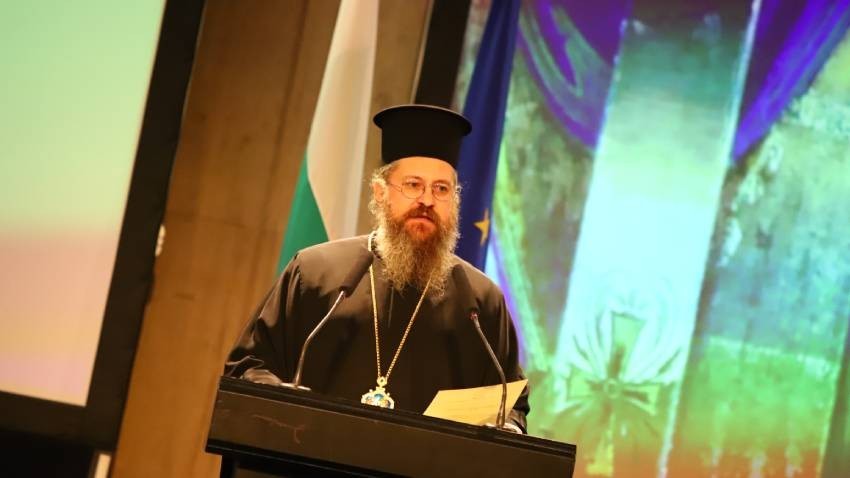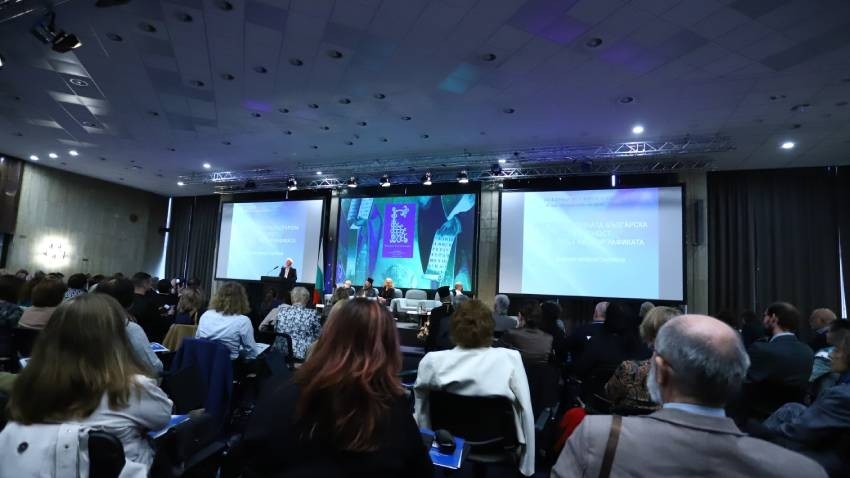“It was in the Bulgarian lands that the disciples of Cyril and Methodius established cultural hubs, raising Bulgaria to a second centre of Orthodox civilization after Byzantium. It was here that the root, the foundation from which all-Slavic culture drew strength and flourished was to be found, asserting for all time the universal principle and equality in the Christian world.” With these words, via video address, President Rumen Radev opened the international conference in Sofia dedicated to the Cyrillic alphabet called “We, too, in this world have performed a good deed”.
“Today the Cyrillic alphabet does not belong solely to the Bulgarian people. Having started their journey from our lands, these letters now shed light over a much wider spiritual domain, uniting hundreds of millions of people. Having become our most precious gift to human civilization, the Cyrillic alphabet throws bridges, connects worlds, eradicates distances and differences,” the Bulgarian head of state said.

In Patriarch Neophyte’s address, read out by Bishop Polycarp, the Bulgarian Patriarch stated that the alphabet is a symbol of our Slavic Orthodox identity, and that it is identity that constitutes one of the problems of today’s world. “The attempts to disrupt it spiritually and culturally lead to painful processes which invariably inflict deep wounds on society,” he says.
It is inadmissible for history to be substituted, distorted, to be sometimes obligingly forgotten so as serve the current political situation or geostrategic interests, Vice President Iliana Iotova said in her address.
“This international forum dedicated to the Cyrillic alphabet is our way of opposing any attempts - from the East or from the West – to substitute the facts, to deny the contribution of the Bulgarian state, to reject or to downplay the significance of the two literary schools – the Preslav and the Ohrid school, whose influence extends far beyond the borders of what was then Bulgaria.”

The scientific forum, convened at the initiative of Vice President Iliana Iotova, brought together prominent Bulgarian scholars, as well as Bulgarian language studies experts from 11 countries, among them Austria, Belgium, Germany, Greece, Italy, Poland, Lithuania and Serbia. Their reports will focus on the alphabet as Bulgaria’s contribution to the world cultural treasure trove. The idea is for the scientific meeting to become a regular event, taking place every other year as a platform for presenting new scientific facts and studies of the Cyrillic alphabet, Vice President Iotova said.
The conference will end with a round table “The Cyrillic alphabet in the 21st century” and an exhibition presenting “The miracle-working icons and holy relics in the Balkans”, organized by the Foreign Ministry’s State Institute for Culture.
On 8 and 9 November the participants from abroad will take a trip to Bulgaria’s old capitals Pliska, Preslav and Rurnovo, the depositories of some museums and will visit some newly discovered epigraphic and archaeological landmarks in Northeastern Bulgaria.
Photos: BGNES
Bulgarian actress Maria Bakalova has appeared on the cover of Vogue CS . ‘’ One of my biggest dreams just came true. I’m so overexcited to share with you all my first Vogue cover! January 2025 print issue!’’, Maria Bakalova wrote in the social..
The Bulgarian film "Tarika" , directed by Milko Lazarov, won the Best Film award in the international competition category at the 30th Kolkata International Film Festival held in India. "Tarika" won the Golden Royal Bengal Tiger Award, accompanied..
The 51 st Sofia International Book Fair opens today at the National Palace of Culture in Sofia. The forum, which will be on until 15 December, is organized by the Bulgarian Book association. 160 publishing houses are taking part in the forum..
The latest project by director Stefan Komandarev, "The Block Universe", is one of the 35 selected projects at the most important global forum for film..
The latest Bulgarian film "Before I Forget" can be seen in cinemas from today. It depicts the sad reality of one of the most common modern diseases -..

+359 2 9336 661
